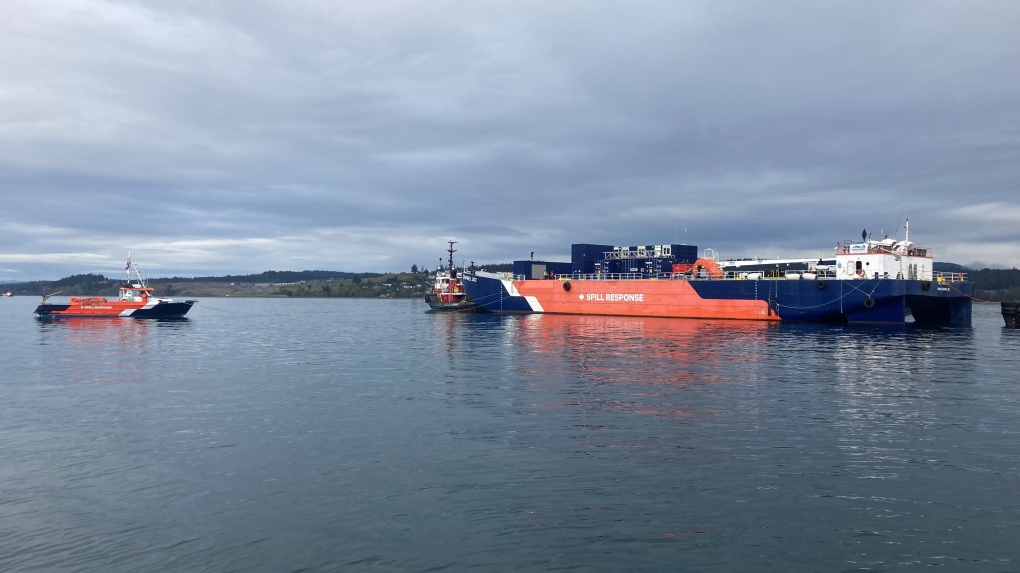Realistic oil spill response training taking place off southern Vancouver Island
 The training exercise is pictured near Colwood. April 26, 2023. (CTV News)
The training exercise is pictured near Colwood. April 26, 2023. (CTV News)
An oil spill response exercise took place Wednesday off the shore of Esquimalt Lagoon in Colwood.
The federally-mandated exercise is required by Transport Canada every two years for Western Canada Marine Response Corporation (WCMRC) to maintain its certification.
The realistic simulation of a 2,500-ton spill involved more than 12 vessel with at least 70 crew members, as well as an additional 100 staff representing more than 30 agencies working on land.
"Just like any other response organization, when you don’t have these bog spills you can test yourself on, you do need opportunities to exercise and train," said Michael Lowry, senior manager of communication for WCMRC.
"So it’s an excellent opportunity for us to get out here," he said. "We have six different bases within the area too. It’s a great chance for our folks from the different bases to come and work together on a large scale operation."
PREPERATION
The shipping lanes that run from the Strait of Juan de Fuca to the Port of Vancouver are used by about 3,500 deep sea vessels every year, and that number is expected to increase with the federal government’s approval of the Roberts Banks Terminal 2 in Delta.
WCMRC says that with more marine traffic, the chances of an actual spill increases. With its six bases stationed on Vancouver Island and the Lower Mainland, the corporation has a six hour response time to spills throughout the southern coast.
 The training exercise is pictured near Colwood. April 26, 2023. (CTV News)The response corporation says it is designed for low-probable but high consequence spills and uses specialized vessels and equipment including rapid response skimming vessels to respond to a spill.
The training exercise is pictured near Colwood. April 26, 2023. (CTV News)The response corporation says it is designed for low-probable but high consequence spills and uses specialized vessels and equipment including rapid response skimming vessels to respond to a spill.
WCMRC also considers itself the fire department on the ocean.
Based on a polluter pay model, WCMRC's state of readiness is funded by both the shipping and oil industry requiring ships over a certain size to have a membership with a certified response organization.
Additional funding comes from oil handling facilities that ship oil along the coast that must pay a bulk oil fee.
In the event of an actual spill, that particular polluter must pay for the corporation's response. If the clean up costs are beyond the polluter's ability to pay, there are international and Canadian funds to cover the cost.
"The idea here is it's industry-funded polluter pay, not a taxpayer regime," said Lowry.
The 30 agencies involved in the practice included representatives of the federal, provincial and municipal governments, alongside First Nations.
Wednesday's exercise was realistic in its response where containment of the spilled oil and protecting any critical areas was a first priority.
On water recovery by a number of different vessels is the next step making sure all the oil is off the water before on shore clean up begins.
Depending on what type of oil is spilled and how contaminated it is – the corporation says recovered oil can be recycled into asphalt.
WCMRC says it responds to about 20 smaller spills a year that are typically a fishing vessel that’s run aground that generally take a few hours or a few days to deal with. It says there has never been a spill the size it’s training for in Canadian waters.
CTVNews.ca Top Stories

Canadian family stuck in Lebanon anxiously awaits flight options amid Israeli strikes
A Canadian man who is trapped in Lebanon with his family says they are anxiously waiting for seats on a flight out of the country, as a barrage of Israeli airstrikes continues.
Suspect in shooting of Toronto cop was out on bail
A 21-year-old man who was charged with attempted murder in the shooting of a Toronto police officer this week was out on bail at the time of the alleged offence, court documents obtained by CTV News Toronto show.
Scientists looked at images from space to see how fast Antarctica is turning green. Here's what they found
Parts of icy Antarctica are turning green with plant life at an alarming rate as the region is gripped by extreme heat events, according to new research, sparking concerns about the changing landscape on this vast continent.
DEVELOPING 2 dead after fire rips through historic building in Old Montreal
At least two people are dead and others are injured after a fire ripped through a century-old building near Montreal's City Hall, sources told Noovo Info.
Yazidi woman captured by ISIS rescued in Gaza after more than a decade in captivity
A 21-year-old Yazidi woman has been rescued from Gaza where she had been held captive by Hamas for years after being trafficked by ISIS.
A 6-year-old girl was kidnapped in Arkansas in 1995. Almost 30 years later, a suspect was identified
Nearly 30 years after a six-year-old girl disappeared in Western Arkansas, authorities have identified a suspect in her abduction through DNA evidence.
Dolphins 'smile' at each other when they play and to avoid misunderstanding, study finds
For humans, flashing a smile is an easy way to avoid misunderstanding. And, according to a new study, bottlenose dolphins may use a similar tactic while playing with each other.
Pit bulls in B.C. pet mauling tested positive for meth, cocaine, says city
Three pit bulls involved in a deadly attack on another dog last month in Kamloops, B.C., tested positive for methamphetamine and cocaine, and the city is going to court to have them put down.
Tax rebate: Canadians with low to modest incomes to receive payment on Friday
Canadians who are eligible for a GST/HST tax credit can expect their final payment of the year on Friday.


































